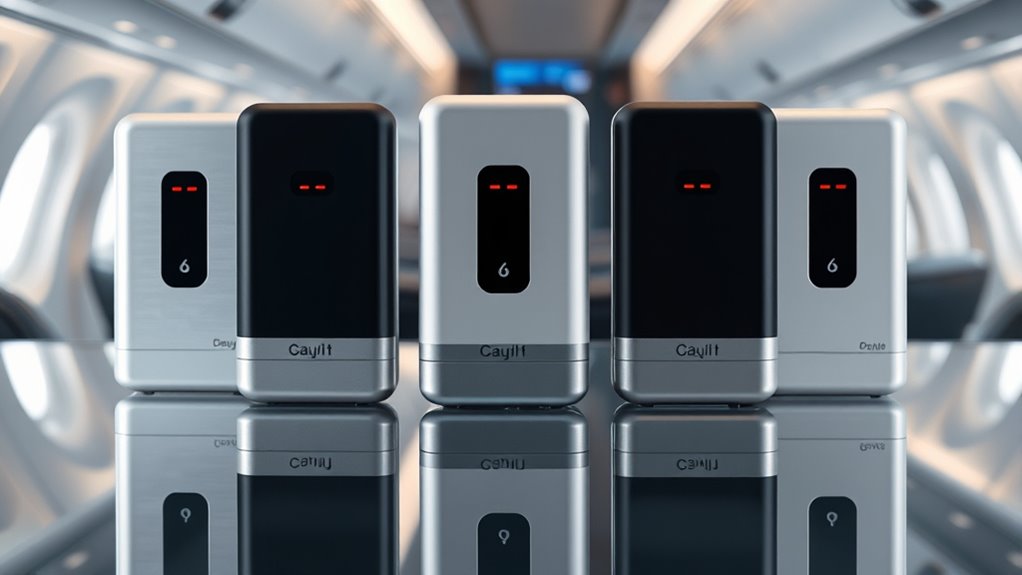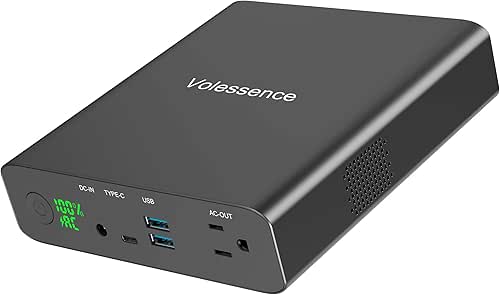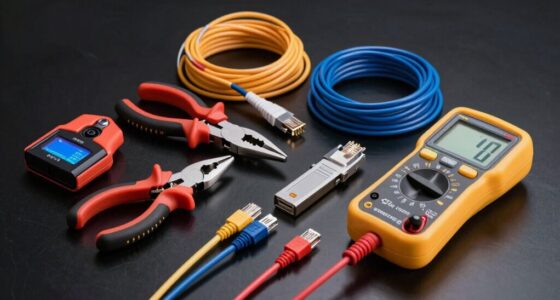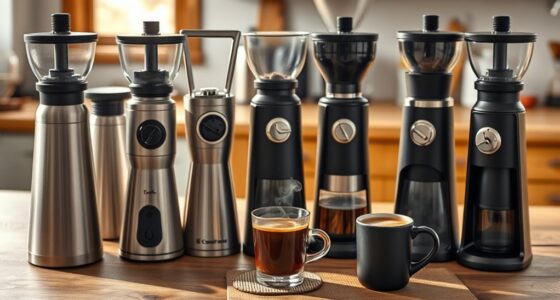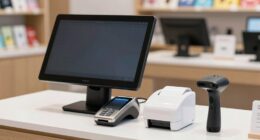If you’re looking for the 5 best airline-approved battery packs for medical devices in 2025, I’ve got you covered. I recommend options like the Freedom CPAP Backup Power, EASYLONGER ES960, and Krisdonia’s TSA-approved 27,000mAh charger. These provide reliable power, are lightweight, and meet airline regulations. They also support various devices with fast charging features. Keep going to discover detailed insights and which model best fits your travel needs.
Key Takeaways
- Prioritize battery packs with 160Wh or less capacity for airline approval and compliance.
- Ensure compatibility with major CPAP models like ResMed, Philips, and Transcend.
- Look for lightweight, portable designs weighing under 4 pounds for easy travel.
- Choose models with multiple charging options, fast recharging, and pass-through capabilities.
- Verify airline approval and safety certifications such as UN38.3 for secure in-flight use.
Freedom CPAP Battery Backup Power Supply
The Freedom CPAP Battery Backup Power Supply is an ideal choice for travelers who need reliable, portable power for their CPAP devices, especially during flights or outdoor adventures. Its 160 Watt Hour lithium-ion capacity guarantees sufficient backup power, while its compact size (7.9 x 5.1 x 1.0 inches) and light weight (3.7 pounds) make it easy to carry. It includes an LED power indicator and an AC charging adapter, making recharging simple. Compatibility with popular models like ResMed, Philips, and Transcend means you can use it with most CPAPs. Just remember to verify airline policies before flying with it.
Best For: travelers, campers, and those experiencing power outages who need a reliable, portable backup power source for their CPAP devices.
Pros:
- Compact and lightweight design for easy portability
- Compatible with multiple popular CPAP models, including ResMed, Philips, and Transcend
- Includes LED power indicator and AC charging adapter for convenient recharging
Cons:
- Runtime varies depending on device settings and heating features; may be limited with heated humidifiers
- Some models require a separate 14V output cable (sold separately) for compatibility
- Airline policies on lithium-ion batteries vary; users should verify regulations before flying
EASYLONGER CPAP Battery Backup Power Supply (ES960)
If you’re seeking a reliable backup power solution for your CPAP device during travel or emergencies, the EASYLONGER CPAP Battery Backup Power Supply (ES960) stands out with its impressive 297.6Wh capacity—far exceeding airline limits. It’s compatible with popular models like AirSense 11, DreamStation, and AirMini, and includes four DC cables for easy connection. Its high capacity can power your CPAP for over two nights, even with humidifier and heated tube off. Plus, it supports multiple devices, offers wireless charging, and can be recharged via Type-C, AC, or solar panel. Built with safe LiFePO4 cells, it’s durable, long-lasting, and rated 4.5 stars from hundreds of reviews.
Best For: travelers and emergency preparedness users seeking a reliable, high-capacity backup power supply for CPAP devices and other electronics.
Pros:
- High capacity of 297.6Wh can power CPAP devices for over two nights, ideal for travel or emergencies.
- Compatible with a wide range of CPAP models including AirSense, DreamStation, and AirMini, plus support for multiple other devices.
- Built-in safety features with LiFePO4 cells ensure durability, longevity, and safe operation during over-charge, over-discharge, or short circuits.
Cons:
- Heavier and bulkier (6.6 pounds) compared to smaller portable batteries, which may affect portability.
- Requires separate cables or adapters for some device models not directly compatible with included DC cables.
- Charging time can be 5-8 hours depending on the power source, which may be lengthy for urgent needs.
Krisdonia Portable Laptop Charger (TSA-Approved) 27000mAh 130W
For travelers needing reliable power on the go, the Krisdonia Portable Laptop Charger offers an excellent solution, especially since it’s TSA-approved for airline travel. Its 27,000mAh capacity and 130W AC output can fully charge laptops, drones, or projectors, making it versatile for various devices. It features fast recharging in about 4.5 hours and pass-through charging, so you can power your devices while recharging the bank. Equipped with USB-A ports supporting quick charging, it’s perfect for mobile phones. Built with safety in mind, it includes multiple security protections. Overall, it’s a durable, efficient option for extended travel, outdoor activities, or emergencies.
Best For: travelers, outdoor enthusiasts, and emergency preparedness individuals needing reliable, portable power for multiple devices on the go.
Pros:
- High capacity of 27,000mAh with 130W AC output for versatile device charging
- Fast recharging time of approximately 4.5 hours and pass-through charging capability
- TSA-approved design with built-in safety protections ensuring safe travel and use
Cons:
- Slightly heavy and bulky due to its large capacity and multiple features
- Limited to 130W AC output, which may not power high-wattage devices
- Requires a specific charger (19V/2A) for recharging, which may not be included
Backup Power Supply & Travel Battery (2nd Gen) with Swappable 150Wh Cell Pack
Travelers who rely on CPAP devices will find the Backup Power Supply & Travel Battery (2nd Gen) with Swappable 150Wh Cell Pack to be an essential solution, especially since it’s FAA-approved for in-flight use. Its compact, lightweight design (just 3 pounds) makes it easy to carry, and the swappable 150Wh cell pack allows for unlimited runtime extension. Compatible with popular CPAP models like ResMed and Philips, it uses your existing AC charger for easy recharging. No extra chargers are needed, simplifying travel. Whether you’re flying, camping, or on the go, this versatile power supply guarantees your device stays powered and ready wherever you are.
Best For: travelers and outdoor enthusiasts who need a lightweight, FAA-approved backup power solution to keep their CPAP devices running during flights, camping, or remote trips.
Pros:
- Swappable 150Wh cell pack enables unlimited runtime extension for extended use.
- Compact, lightweight design (3 pounds) makes it highly portable and travel-friendly.
- Compatible with a wide range of popular CPAP models and uses existing AC chargers, simplifying recharging.
Cons:
- Limited to 150Wh capacity, which may not be sufficient for very long trips without swapping packs.
- No included external charger; relies on existing CPAP AC power supply, which may not be available in all situations.
- Customer reviews are limited, so long-term durability and performance are less established.
27000mAh Portable Laptop Charger with AC Outlet (TSA-Approved)
The 00mAh Portable Laptop Charger with AC Outlet (TSA-Approved) stands out as an ideal power solution for medical device users who need reliable, airline-approved charging options during travel. Its compact design and TSA approval make it perfect for on-the-go use, fitting easily into carry-on bags. It provides a stable AC outlet compatible with various devices, including laptops, CPAP machines, and small appliances. With a built-in digital display, I can monitor the battery level at a glance. Lightweight yet powerful, this charger guarantees my medical devices stay powered during trips, offering peace of mind and convenience wherever I go.
Best For: travelers and outdoor enthusiasts who need a reliable, TSA-approved portable power source for laptops, medical devices, and small appliances during trips.
Pros:
- High-capacity 27000mAh/99.9Wh battery provides extended power for multiple devices.
- TSA-approved and compact design easily fits in carry-on luggage for hassle-free travel.
- Supports simultaneous charging of up to four devices with multiple ports and a digital display for battery monitoring.
Cons:
- Slightly heavier than smaller portable chargers, which may be a consideration for ultra-light travelers.
- Limited to devices less than 130W, so it may not power higher wattage appliances.
- Recharging takes approximately 4-5 hours, which may require planning during travel or outdoor use.
Factors to Consider When Choosing Airline-Approved Battery Packs for Medical Devices
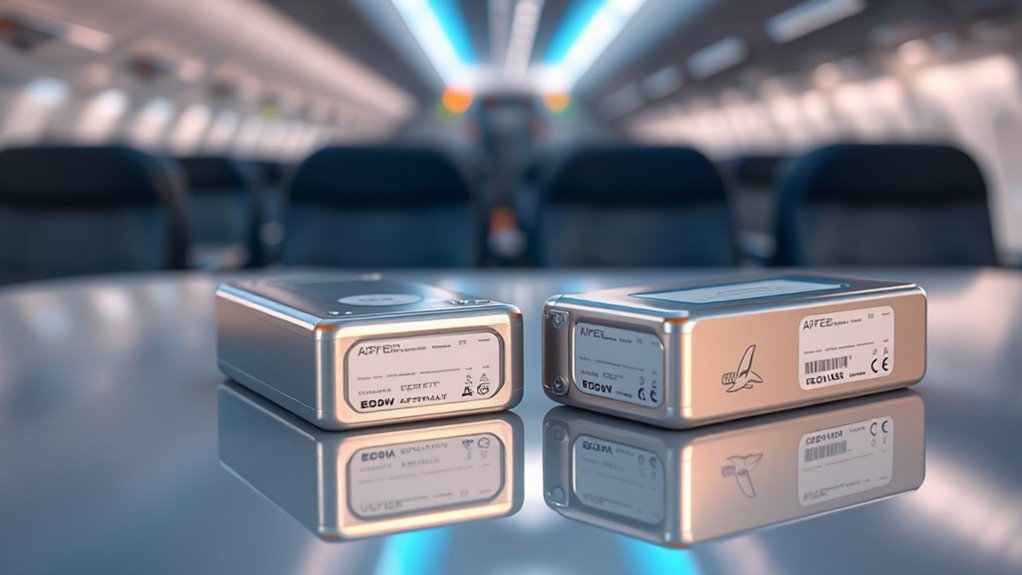
When selecting airline-approved battery packs for medical devices, I consider several key factors to guarantee safety and functionality. These include battery capacity limits, compliance with airline regulations, and compatibility with my device. Additionally, I look at portability, size, and charging options to find the best fit for my travel needs.
Battery Capacity Limits
Choosing the right battery capacity for airline-approved medical device packs is crucial to guarantee smooth travel without delays or compliance issues. Airlines typically restrict lithium-ion battery packs to a maximum of 100Wh for carry-on luggage without needing approval. If the capacity exceeds 100Wh but stays within 160Wh, you may need airline approval before flying. Batteries over 160Wh are generally prohibited in passenger cabins and require special arrangements. To determine capacity, multiply the voltage (V) by the ampere-hours (Ah) and convert the result to watt-hours (Wh). Keep in mind, airline policies vary, so always check specific airline guidelines. Selecting a pack within these limits minimizes complications and ensures your device remains compliant throughout your journey.
Airline Regulations Compliance
Have you verified that your medical device’s battery pack meets airline regulations before travel? Making sure compliance is essential to avoid delays or confiscation. First, check that the battery’s capacity doesn’t exceed airline limits—typically 100Wh for carry-on and up to 160Wh with airline approval. Look for batteries explicitly labeled as airline-approved or compliant with IATA regulations. Confirm the battery has safety certifications like UN38.3, which proves it’s passed safe air transport tests. Additionally, verify if the airline permits in-flight use of the battery, as some may have stricter rules. Remember, batteries over 100Wh require approval and must be declared during security checks. Staying informed and prepared helps guarantee a smooth journey with your medical device.
Device Compatibility
Ensuring your airline-approved battery pack is compatible with your medical device is essential for safe and reliable operation during travel. First, verify that the battery matches your device’s specific model to ensure proper function. Check the voltage and wattage output to match your device’s requirements, preventing underperformance or damage. It’s also important to confirm that the battery supports the necessary connector types and cable configurations for seamless connection. Additionally, consider the battery’s capacity and runtime to meet your travel or backup needs without interruption. Finally, verify the battery pack is certified as airline-approved, complying with TSA and FAA regulations for in-flight safety. These compatibility factors help guarantee your device operates correctly and safely throughout your journey.
Portability and Size
When selecting an airline-approved battery pack for your medical device, portability and size should be top considerations. Choose a compact pack, ideally under 8 inches long, to make airport security checks smoother and storage easier on planes. Lightweight options, preferably under 4 pounds, help reduce travel fatigue and guarantee compliance with airline weight restrictions. Opt for slim, rectangular designs that fit comfortably in carry-on bags or pockets, making transport more convenient. Also, verify that the capacity aligns with airline regulations—typically under 100Wh or within permitted limits with approval. Features like built-in handles or ergonomic grips are a bonus, as they make carrying easier during travel. Prioritizing size and portability ensures seamless journeys while keeping your medical device powered reliably.
Charging Options & Speed
Choosing a battery pack that supports fast charging options can considerably reduce downtime, especially when you’re on the move. Look for packs that feature USB-C Power Delivery or high-wattage AC adapters, which can recharge quickly and get you back to full power faster. It’s also beneficial to have multiple charging ports, like USB-A and USB-C, so you can power your device while recharging the pack simultaneously. Pay attention to the input wattage—higher wattage (60W or more) generally means faster recharging times. Additionally, consider battery packs with pass-through charging, allowing you to use your device while the pack is charging. Ensuring the charging speed aligns with your travel schedule helps maintain reliable power without unnecessary delays.
Safety Certifications & Standards
Safety certifications and standards are vital considerations because they verify that a battery pack meets recognized safety requirements for medical devices and airline travel. I always check for certifications like UL, CE, or FCC, which confirm compliance with safety regulations. It’s also imperative to verify that the internal protection circuits prevent overcharging, over-discharging, short circuits, and overheating, guaranteeing safe operation during travel. I look for battery packs with built-in fire-resistant materials and thermal management systems to reduce the risk of ignition or thermal runaway. Additionally, high-quality cells, such as Lithium Iron Phosphate (LiFePO4), offer greater stability and safety. Finally, reviewing product documentation for airline-specific regulations helps guarantee the battery pack will meet all safety standards and avoid issues during travel.
Runtime and Recharging
The runtime of a battery pack is primarily determined by its capacity and the power demands of your medical device. To estimate how long it will last, I divide the battery’s capacity, measured in Wh or mAh, by the device’s wattage or power requirements. Keep in mind that additional features like heating elements or humidifiers can increase consumption. Recharging times depend on the charger’s wattage and the battery size—higher wattage chargers typically mean faster recharges. Many portable packs support multiple recharging methods, such as AC wall adapters, USB-C PD chargers, or even solar panels, which adds flexibility during travel. Quick recharge features or pass-through charging can be real lifesavers, letting you power up or use the device simultaneously, especially when on the go or facing power outages.
Frequently Asked Questions
Are These Battery Packs Compatible With All Medical Devices?
Not all battery packs are compatible with every medical device. I always check the device’s specifications and manufacturer guidelines before choosing a battery pack. Airline-approved options are designed for safety and reliability, but compatibility varies depending on device type and power requirements. I recommend consulting with the device manufacturer or a medical professional to guarantee the battery pack you select will work correctly and safely with your specific equipment.
What Is the Maximum Allowed Weight for Airline-Approved Battery Packs?
The maximum allowed weight for airline-approved battery packs is typically around 2 kilograms or 4.4 pounds per battery. I recommend checking the specific airline’s regulations, as they might have slightly different limits. Remember, batteries exceeding these limits may need special approval or must be carried as cargo. Always verify the current guidelines before traveling to make sure your medical device batteries conform to airline safety standards.
How Long Do These Battery Packs Typically Last on a Single Charge?
I know you’re curious about how long these battery packs last on a single charge. Typically, they power medical devices for about 8 to 12 hours, like a steady heartbeat keeping rhythm. This duration acts as a reliable pulse, ensuring your device stays active throughout the day. Think of it as a loyal companion, always ready to support you when you need it most, without interruption.
Can These Batteries Be Used Internationally Without Additional Certifications?
Yes, these batteries can generally be used internationally without extra certifications, but you should always double-check specific airline and country regulations. I recommend consulting your device manufacturer or airline beforehand to confirm compliance. While most airline-approved batteries meet international standards, some regions may have additional requirements. Staying informed helps prevent any issues during travel, giving you peace of mind knowing your medical device remains powered and compliant everywhere you go.
What Safety Features Are Included to Prevent Overheating or Short Circuits?
I’ve looked into these battery packs, and they include several safety features to prevent overheating and short circuits. They have built-in thermal cut-offs that shut down power if temperatures get too high, and advanced circuit protection to prevent overloads. Plus, they’re equipped with automatic shut-off mechanisms and high-quality insulation to guarantee safe operation during travel. These features give me peace of mind knowing my medical device stays safe and reliable.
Conclusion
Choosing the right airline-approved battery pack is like carrying a trusted guardian on your journey—a beacon of security and hope. It’s more than just power; it’s peace of mind, ensuring your medical device is always ready to support you, no matter where life takes you. When you pick the right pack, you’re holding onto a symbol of resilience and freedom, empowering you to face each new horizon with confidence and strength.
